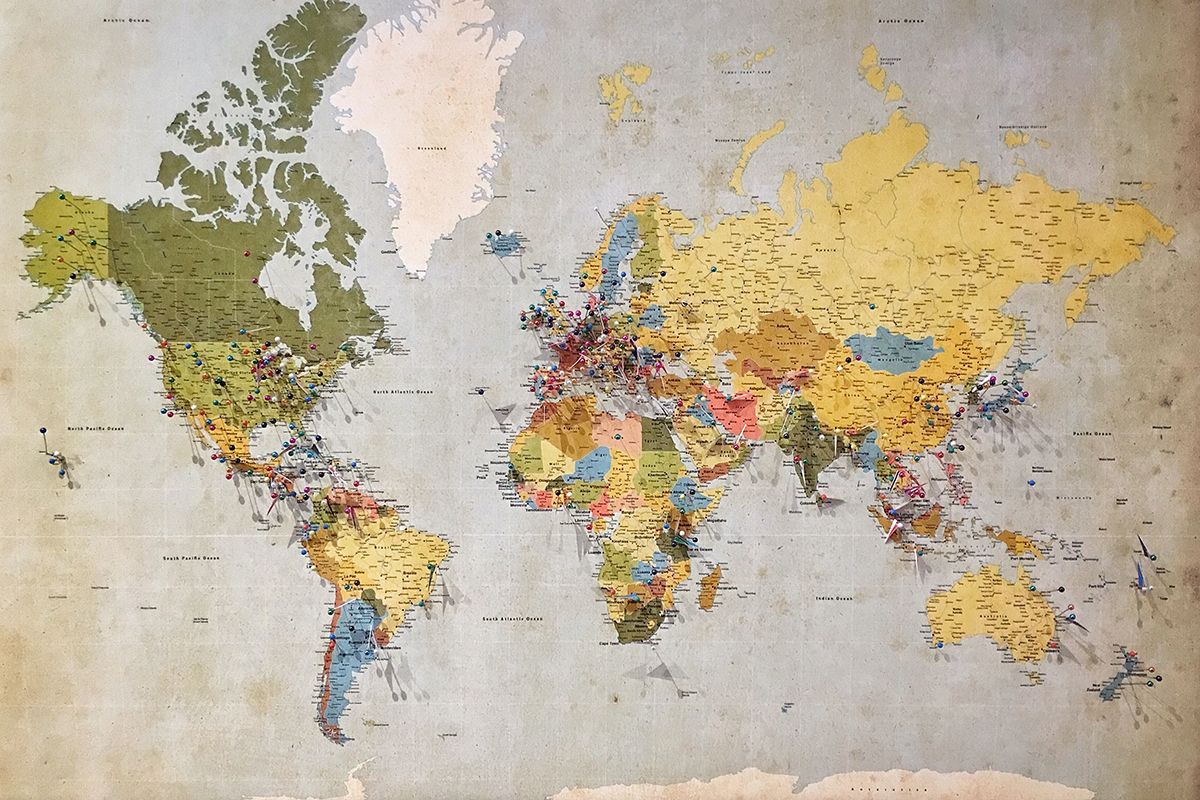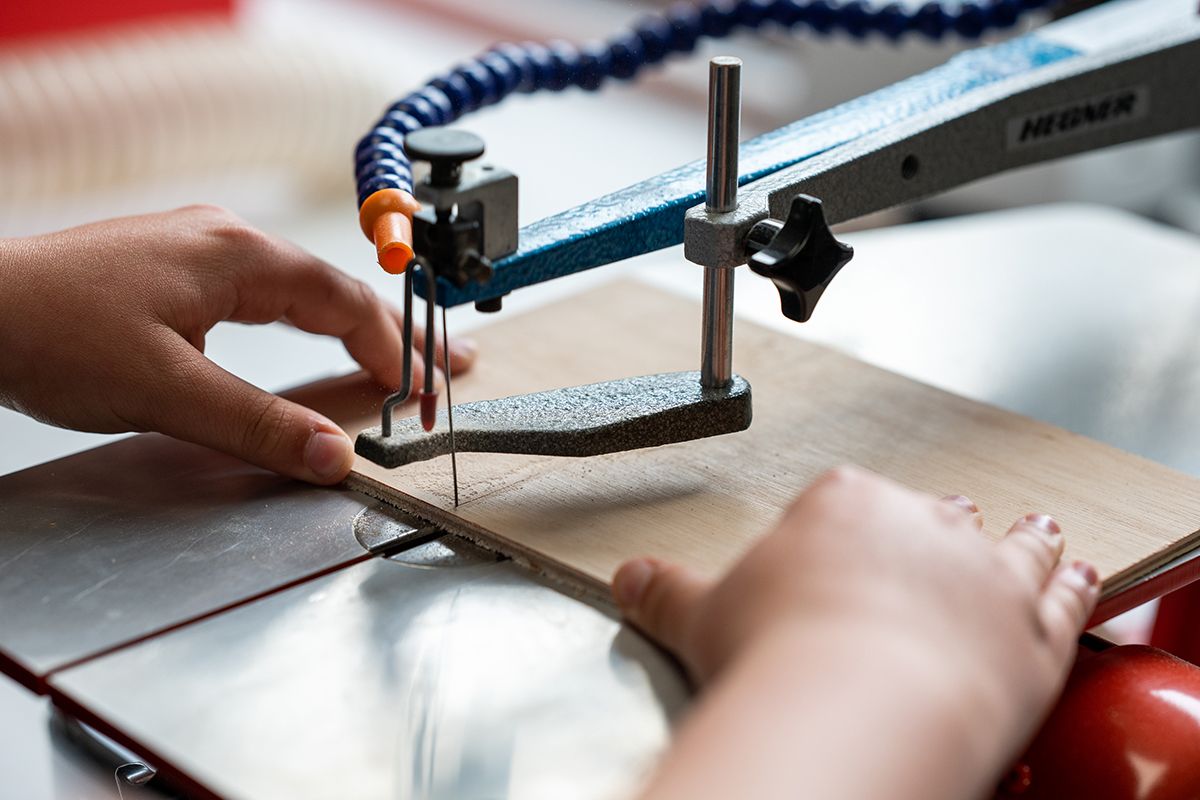Curriculum
At Medina College, we are a learning community which embraces opportunities for our learners by securing high quality learning and teaching. We aim for students to achieve their potential both as students at our schools and as global citizens. Our vision is based on the mission statement of ‘Aspire’ and ‘Achieve’. Our core values are: Ambition, Success, Progress, Inspiration, Respect and Equality. These values underpin our approach to teaching and learning and integral to all aspects of school life.
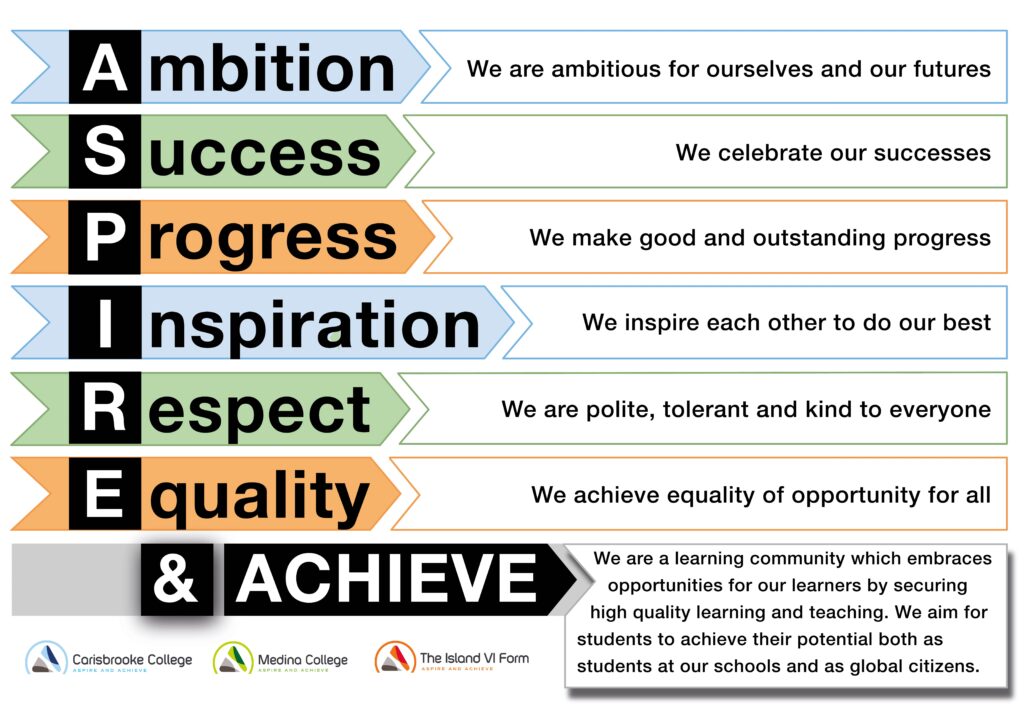
In 2019 we had a full review of our curriculum offer and changed from a 2 Year to a 3 Year key Stage 3. At this point we began the process of aligning the curriculum and subject offers with our partner school, Carisbrooke College, that sits within the IWEF Federation. The benefits in terms of sharing best practice and resources has led to a wider choice of courses for our students and higher expectations in terms of outcomes. As part of this process the Teaching & Learning team along with faculty leaders then carefully considered what questions needed to be answered to improve our curriculum and in turn provide better learning opportunities for our students.
The questions we asked of ourselves were:
1. KS2-3 Transition: What knowledge and skills did our students learn/experience in primary?
2. Intent: What is the purpose of teaching your subject?
3. Content/Skills: What knowledge and skills need to be learnt?
4. Pedagogy: What will teaching look like for effective learning?
5. Sequencing: What order are you going to ‘teach things’?
6. Rationale: What is the rationale for your sequence? How does it build knowledge?
7. Vocabulary: How will you develop the use and understanding of Tier 2 and Tier 3 vocabulary and command words?
8. Assessment (Formative and Summative): How will you measure attainment and progress?
9. SMSC: How does your curriculum facilitate a students’ social, cultural, spiritual and cultural development?
10. Cultural Capital: What experiences do you facilitate for your students beyond your lessons to enable them to acquire ‘knowledge beyond their experiences’
11. Careers: How do you ensure students understand the import of your subject in students’ aspirations?
12. Impact: How do you know your curriculum is ‘Good’?
This is evaluated through Faculty, leadership and external monitoring has led to an improved provision across the curriculum and beyond resulting in higher attainment for all.
At Medina College our curriculum provides teachers, students, school leaders and community stakeholders with a measurable plan and structure for delivering a high quality education. The curriculum identifies the learning outcomes, standards and core skills and knowledge students must demonstrate before advancing to the next level education and employment. The curriculum is broad and balanced and meets National Curriculum expectations. It also promotes spiritual, moral, cultural and physical development of our students.
The curriculum is split into four interrelated parts:
- The macro-curriculum – the subjects and qualifications that we teach, their availability to different pupils and the resources required to teach them. The decisions we explore are based on student entitlement, school breadth and lesson context. This becomes the outer framework for the rest of the curriculum.
- The formal curriculum – the learning and knowledge that makes up the subjects, the actual content that has been chosen to be taught in a specific sequence and the application of proven strategies for educational research. This encompasses the knowledge and skills that we wish for students to demonstrate. This is the content and pedagogy that fills a school’s outer framework.
- The hidden curriculum – is the unwritten, unofficial, and sometimes unintended lessons, values, and insights that students learn in school. It can cover topics such equality, respect, culture and sexuality.
- The extended-curriculum – this encompasses the learning and experiences that take place outside of the classroom. This involves exposure to cultural and sporting activities, opportunities for personal enrichment such as the Duke of Edinburgh Award, and involvement in community and charity events. This is the content that helps to add character and personality to our school’s framework.
At Medina College we aim to develop effective learners who are challenged to have high aspirations. We want our pupils to fully engage with our school values and develop into confident, happy and successful young adults.
Our curriculum value are as follows:
Ambition – our curriculum is ambitious for students with its challenge and aspiration.
Success – our curriculum provides students with the tools they need to succeed in today’s world.
Progress – our curriculum affords every student the opportunity to make good progress and achieve excellence within subjects by developing good links across the curriculum.
Inspiration – our curriculum constantly evolves providing students with opportunities to develop interests and enjoy being critically thinking lifelong learners.
Respect – our curriculum promotes the development of responsible citizens who can make a positive contribution to society.
Equality – our curriculum celebrates and promotes difference and diversity building confident individuals who are able to live safe, healthy and fulfilling lives.
Our curriculum has always been designed to offer a broad and balanced education providing challenges for all students. Its academic focus aims to open doors for all students, regardless of differences in prior attainment, and is tailored to meet the needs of certain individuals for whom extra support and vocational opportunities are required to help access challenging content. We place great emphasis on building positive relationships in school, amongst the students themselves and between staff, students and parents/carers.
The Curriculum:
We operate a 2 weekly timetable that follows the National Curriculum. Pupils are taught for 50 hours in terms of contact time.
For Year 7-9 The curriculum includes:
- English – includes a library lesson to promote reading
- Mathematics
- Science
- French and Spanish (Spanish from Year 8)
- Humanities – History, Geography and Religious Education
- Creative Arts – Art and Design, Drama and Music
- Computing
- Technology – Design, Food, Graphics and Fashion
- Physical Education (two hours per week)
- PSHE and Study Skills
For students who are behind in their chronological reading age, additional support is provided to enable them to rapidly catch up.
For Year 10-11 all students must study the following:
- English – Literature and Language
- Mathematics
- Science – Core and Additional Science or Triple Science – Biology, Physics and Chemistry
- Physical Education (two hours per week) – No external examination
- PSHE and Study Skills
In Year 10, students can choose four options from a wide range of subjects.
Optional Subjects:
- Humanities: Religious Education, History, Geography, Business Studies
- Computing
- Languages: French/Spanish
- Creative: Drama, Music, Music Technology, Art, Photography, Graphics,
- Sports Btec
- Technology: Food, design, Fashion, Health & Social, Child Development
The options take up 40% of the taught curriculum. The remainder of time is allocated to core subjects, PE and PSHE.
Some students who require more support in English and mathematics will take three options and have additional support given to them in these core subjects.
There is an extensive after-school enrichment programme which includes a range of sporting activities, The Duke of Edinburgh’s Award, music and drama. There is daily support for homework in the library.
We schedule a 2 week timetable of 50 lessons of 1 hour. The number of lessons allocated to each subject is:
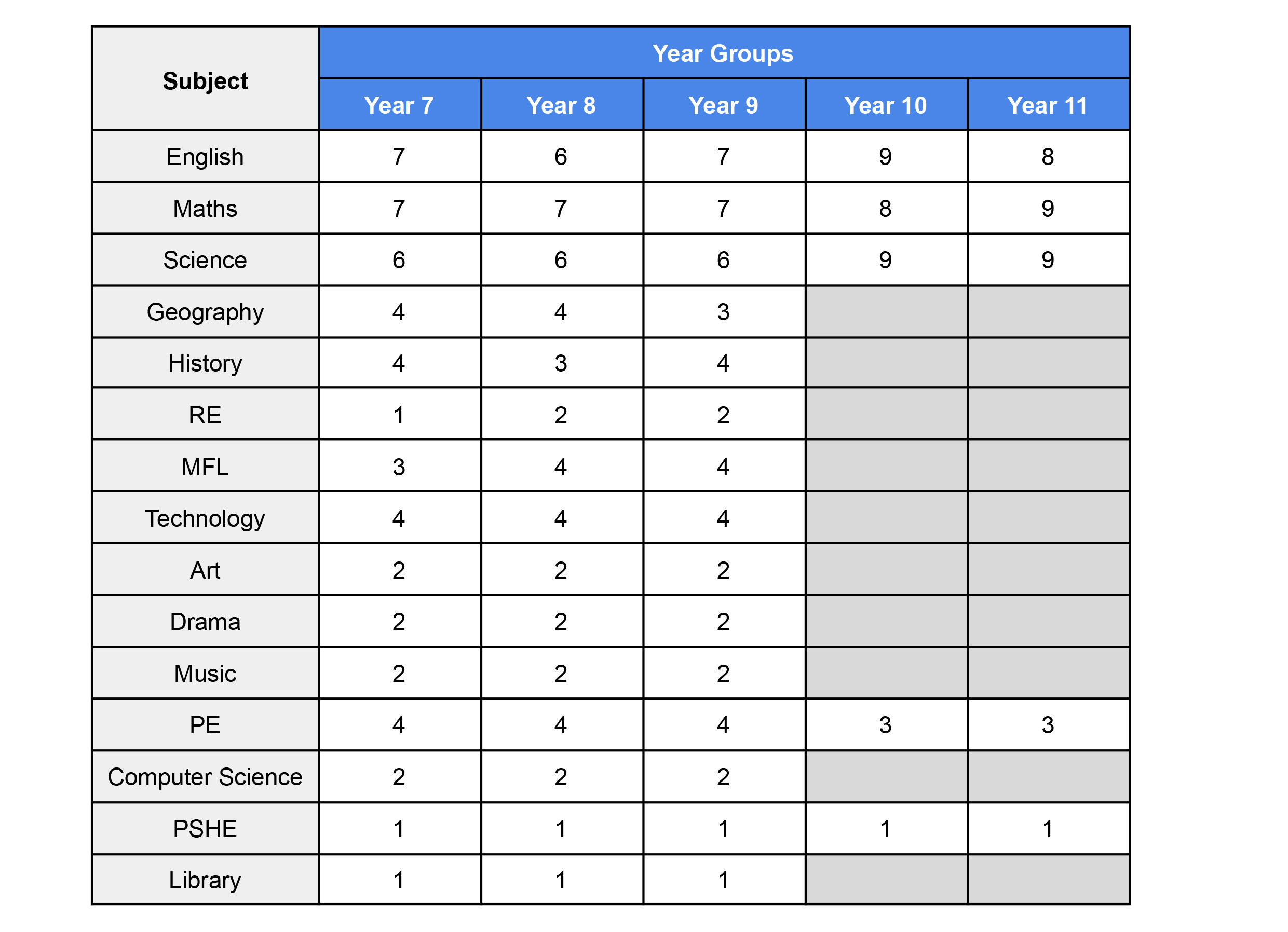
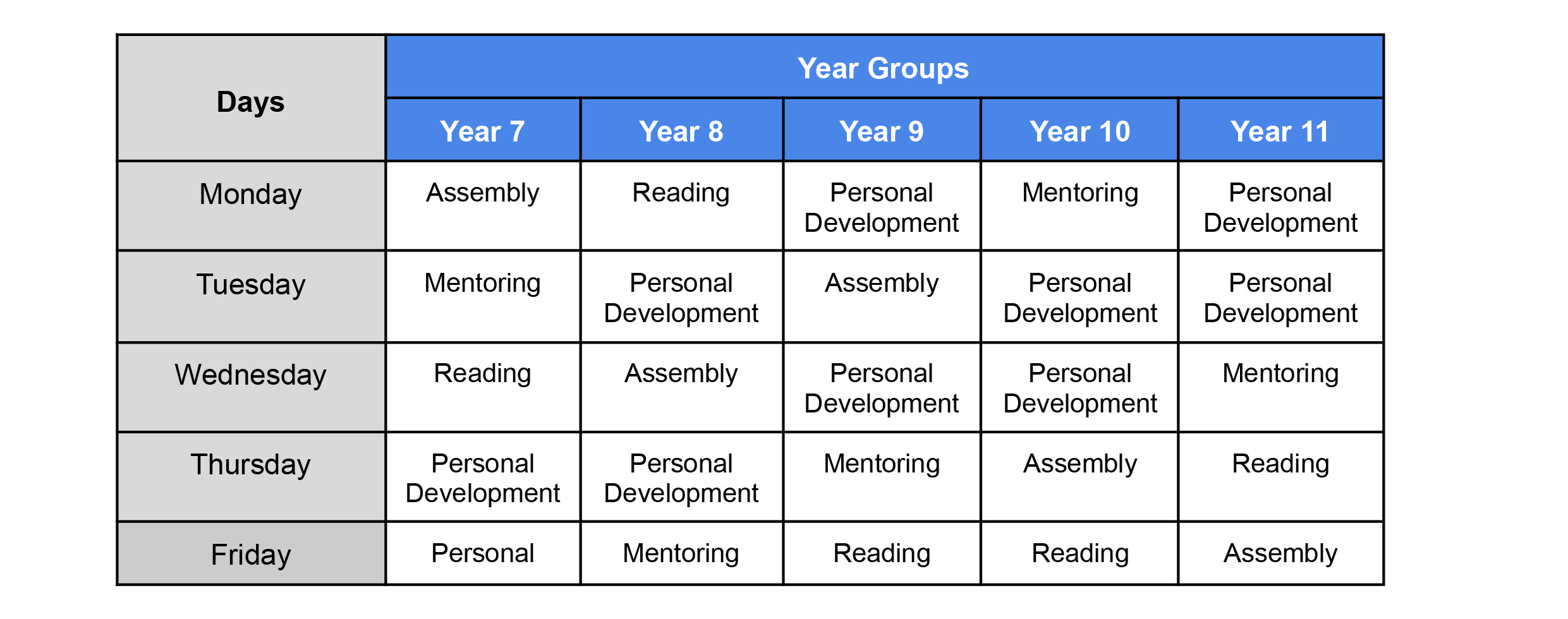
Our students work hard, they believe they will do well and go on to achieve strong outcomes at Medina and beyond. They are confident and understand themselves in the world around them. Students develop skills, knowledge and an understanding which makes them ready for their next stage of education, whether this is studying a Level 3 course, undertaking an apprenticeship or pursuing university studies leading into employment.
We measure our students success and the impact of our curriculum through:
- Levels of progress and attainment
- Attendance rates
- Behaviour and engagement
- Curriculum Reviews
- Lesson Observations and Learning Walks
- Student and parental questionnaire
- Securing ‘Destinations’ and employment opportunities.






